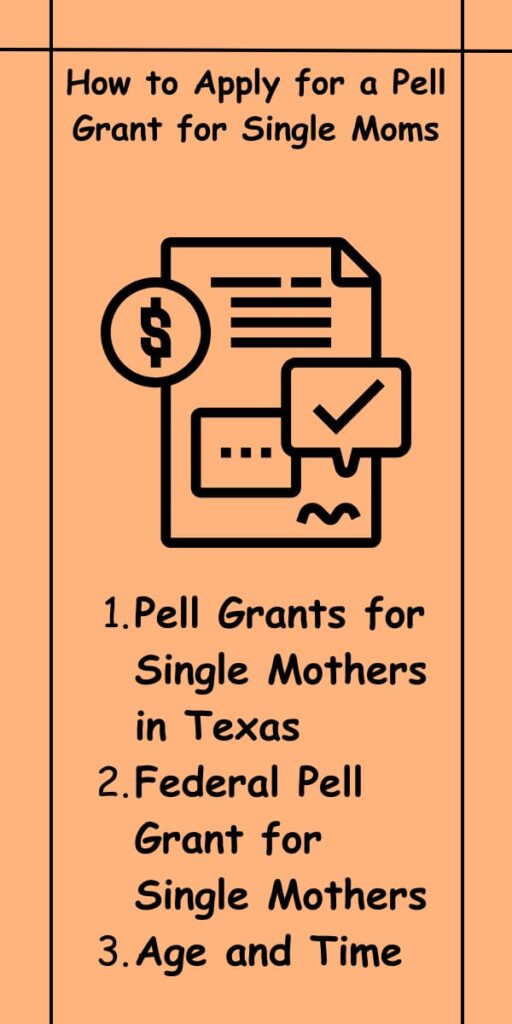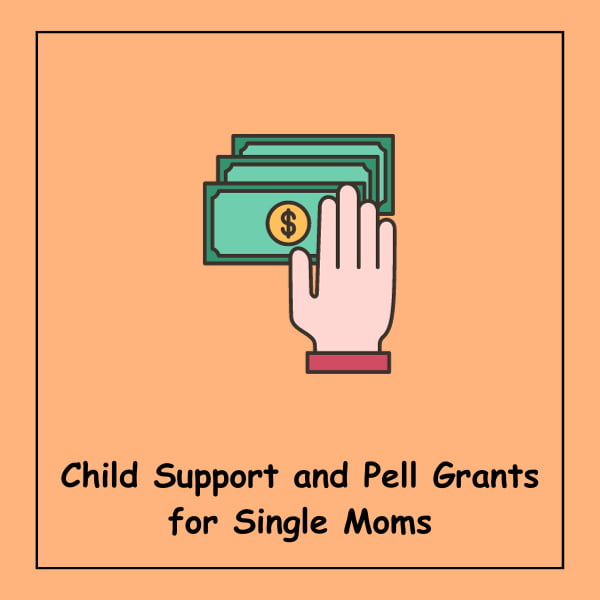Pell Grants are a crucial form of financial aid provided by the U.S. federal government to help low-income students pay for college. For single mothers, who often face unique financial and time constraints,
Pell Grants can be a significant resource. Unlike loans, they do not require repayment, making them a critical tool in helping single moms achieve educational goals, increase earning potential, and create a better future for their children.
What Is a Pell Grant?
A Pell Grant is a form of financial aid provided by the U.S. federal government to help low-income students pay for their education. Administered by the U.S. Department of Education, it is one of the most sought-after grants because it does not require repayment, unlike student loans. Pell Grants are primarily awarded to undergraduate students who have not earned a bachelor’s degree, though there are exceptions for certain post-baccalaureate teaching programs.
Features of a Pell Grant:
- Non-Repayable Financial Aid: Pell Grants do not need to be paid back, making them highly advantageous for students who want to avoid student debt.
- Annual Award Amounts: The maximum award amount changes each academic year based on congressional budget decisions. For example, the maximum award for the 2023-2024 school year was $7,395.
- Flexible Use: The funds can be used for various education-related expenses, including tuition, fees, room and board (if attending full-time), textbooks, supplies, and even transportation or childcare in some cases.
- Direct Payment: The grant is paid directly to the school, which applies it to the student’s expenses. If any funds remain after covering tuition and fees, they may be refunded to the student for other educational needs.
Types of Students Who Qualify:
- Undergraduate Students: Pell Grants are primarily aimed at those pursuing their first bachelor’s degree.
- Certain Post-Baccalaureate Students: Some students enrolled in post-baccalaureate teacher certification programs may also qualify.
Pell Grants are designed to make education more accessible to students from low-income families, which includes many single mothers striving to improve their lives through education.
Read More: Free Window Replacement Program
Determining Pell Grant Eligibility for Single Moms
Eligibility for Pell Grants is determined primarily by financial need, as calculated by the information submitted through the Free Application for Federal Student Aid (FAFSA). Single mothers often have unique financial challenges, which may make them eligible for higher grant amounts. Below is a detailed breakdown of the criteria that determine eligibility:
Factors for Eligibility:
-
Financial Need:
- Expected Family Contribution (EFC): The amount of financial support that a student’s family is expected to provide toward their education costs. Single mothers typically have a lower EFC due to limited income, which can result in greater Pell Grant eligibility.
- Cost of Attendance (COA): The total estimated cost of attending a particular school, including tuition, fees, room, board, books, supplies, and other personal expenses. The difference between the COA and the EFC helps determine financial need.
-
U.S. Citizenship or Eligible Non-Citizen Status:
- To qualify for a Pell Grant, the applicant must be a U.S. citizen or an eligible non-citizen (such as a permanent resident).
-
Enrollment in an Eligible Program:
- Pell Grants are available to students enrolled in eligible undergraduate programs or certain post-baccalaureate teaching programs. The institution must be accredited and participate in federal student aid programs.
-
Satisfactory Academic Progress (SAP):
- To maintain eligibility, students must meet their institution’s standards for academic progress, which typically include a minimum GPA and completion rate of courses.
- Single mothers who are returning to school may want to ensure they are aware of these requirements to avoid losing their eligibility.
-
Enrollment Status:
- Full-time, three-quarter-time, half-time, and less-than-half-time students can qualify for Pell Grants, although the award amount will vary based on the number of credits or classes they take.
Special Considerations for Single Moms:
- Household Income and Family Size: Single mothers must include their income and any child support or public assistance received when completing the FAFSA. This information impacts the EFC calculation.
- Dependency Status: Unlike younger students who may need to provide their parents’ financial information, single mothers are considered independent on the FAFSA, which generally increases their chances of receiving aid based on their personal financial situation.
Application Process for Pell Grants:
- Complete the FAFSA: The Free Application for Federal Student Aid (FAFSA) is the first step in determining eligibility for Pell Grants and other federal student aid. The form is available online at FAFSA.gov.
- Provide Accurate Financial Information: Single mothers must provide information about their income, household size, and other financial details. This data will determine their financial need and grant eligibility.
- Review the Student Aid Report (SAR): Once the FAFSA is processed, applicants receive a Student Aid Report (SAR) summarizing their eligibility and expected family contribution.
- Accept the Grant: Eligible applicants will work with their school’s financial aid office to accept and apply the grant to their educational expenses.
Relate Article: Free Car for Single Mom
Pell Grants for Single Mothers
Pell Grants are a vital resource for single mothers seeking to further their education. As a need-based form of federal financial aid, they are specifically designed to assist low-income students, including single moms, in pursuing post-secondary education. Pell Grants help alleviate financial barriers, allowing single mothers to gain skills, credentials, and degrees that enhance their career prospects and financial independence.
Benefits for Single Mothers:
- No Repayment Required: Unlike student loans, Pell Grants do not need to be repaid, which significantly reduces the financial burden of obtaining an education.
- Flexible Use of Funds: Pell Grants can cover a range of educational expenses, including:
- Tuition and fees
- Books and supplies
- Room and board (if applicable)
- Childcare and transportation expenses (depending on the recipient’s needs and school policies)
- Support for Non-Traditional Students: Single mothers often qualify as non-traditional students, and Pell Grants cater to diverse educational needs, including part-time enrollment and online learning opportunities.
Read More: Free iPhone ACP
Pell Grants for Single Moms Available
The amount a single mother can receive from a Pell Grant varies depending on several factors, such as financial need, cost of attendance (COA), and enrollment status. For the 2023-2024 academic year, the maximum award amount for a Pell Grant was $7,395.
Factors Affecting Pell Grant Awards for Single Moms:
- Expected Family Contribution (EFC): This figure is calculated based on the information provided on the Free Application for Federal Student Aid (FAFSA). Lower-income levels typically result in a lower EFC, which can lead to a higher Pell Grant award.
- Cost of Attendance (COA): This is the total estimated cost of attending a specific institution, including tuition, fees, housing, books, and other expenses. The Pell Grant covers a portion of this amount based on the student’s financial need.
- Enrollment Status:
- Full-Time Enrollment: Generally, full-time students qualify for larger awards.
- Part-Time Enrollment: Pell Grants are available to part-time students as well, but the amount awarded will be prorated based on the number of credit hours or classes taken.
Example Scenario for Single Moms:
- Applicant: Maria, a single mom of two children, earns $20,000 per year and plans to attend a local community college as a full-time student.
- Cost of Attendance (COA): $10,000 for the academic year.
- Expected Family Contribution (EFC): Calculated at $0 due to low income and family size.
Relate Article: Free Money for Single Fathers
Eligibility for Pell Grant for Single Mother
To qualify for a Pell Grant, single mothers must meet the general eligibility criteria established by the U.S. Department of Education. These criteria ensure that federal funds are distributed to students who demonstrate financial need and are committed to pursuing their education.
Eligibility Requirements:
-
Financial Need Assessment:
- Expected Family Contribution (EFC): Financial need is determined by the EFC, which is calculated using information submitted through the FAFSA. Single mothers often have lower household incomes, leading to a lower EFC and higher Pell Grant eligibility.
- Cost of Attendance (COA): The grant amount is determined by subtracting the EFC from the COA of the school.
-
U.S. Citizenship or Eligible Non-Citizen Status:
- Applicants must be U.S. citizens, permanent residents, or eligible non-citizens.
-
Enrollment in an Eligible Program:
- Single mothers must be enrolled in an eligible undergraduate program at an accredited college, university, or vocational school. Pell Grants are available for part-time and full-time students alike.
- Exception: Certain post-baccalaureate programs related to teacher certification may also qualify.
-
Satisfactory Academic Progress (SAP):
- Recipients are required to maintain a minimum GPA, complete a specific percentage of attempted coursework, and meet other academic standards set by their institution to remain eligible for Pell Grants.
-
Dependency Status:
- Single mothers are considered independent students when filling out the FAFSA, meaning only their personal financial information (and not their parents’ income) is considered in determining financial need.
Read More: Free Cleaning Supplies for Low-Income
How to Apply for a Pell Grant for Single Moms

Applying for a Pell Grant as a single mother is a straightforward process aimed at providing you with essential financial aid for pursuing post-secondary education. Here’s a step-by-step guide:
Step 1: Complete the Free Application for Federal Student Aid (FAFSA)
- Visit the FAFSA Website: Go to FAFSA.gov to begin your application.
- Create an FSA ID: This is a username and password that allows you to electronically sign your FAFSA, access your financial aid information, and more.
- Gather Necessary Documents: Be prepared with the following:
- Your Social Security Number
- Your federal income tax returns, W-2s, and other records of money earned
- Bank statements and records of investments (if applicable)
- Records of untaxed income (if applicable)
- If you’re married, your spouse’s income information may be required.
- Provide Accurate Information: When completing the FAFSA, you will be asked for financial details that will help determine your financial need. Single mothers are considered independent students, so you do not need to include parental income.
- List the Schools You Plan to Attend: FAFSA allows you to list up to 10 schools where you intend to apply or are enrolled. These institutions will receive your FAFSA information and use it to assess your eligibility for financial aid.
- Submit Early: The FAFSA opens on October 1st each year. Submitting early maximizes your chance of receiving federal and state funds, as some programs operate on a first-come, first-served basis.
Step 2: Review the Student Aid Report (SAR)
- Check for Accuracy: After submitting your FAFSA, you’ll receive a Student Aid Report (SAR) summarizing your application. Review it carefully to ensure all information is accurate.
- Understand Your Expected Family Contribution (EFC): The SAR will display your EFC, a number used by schools to determine how much financial aid you are eligible to receive. A lower EFC generally means you qualify for more aid.
Step 3: Communicate with Financial Aid Offices
- Contact Your Chosen Schools: Reach out to the financial aid offices of the schools you’ve applied to or are attending. They will provide information on the aid package you qualify for, including Pell Grants.
- Provide Additional Documents if Needed: Some schools may request extra documentation, such as proof of income or dependency status, to finalize your aid package.
Step 4: Accept Your Pell Grant Award
- Understand the Award Terms: Review the terms of the Pell Grant award, including how the funds will be applied (typically toward tuition and fees) and whether any remaining balance will be disbursed to you for other educational expenses.
- Accept the Award through Your School’s Financial Aid Office: The financial aid office will guide you on how to accept the award and ensure the funds are applied appropriately.
Step 5: Maintain Eligibility
- Satisfactory Academic Progress (SAP): To continue receiving aid, you must meet your institution’s SAP requirements, which typically involve maintaining a minimum GPA and completing a certain percentage of coursework.
- Reapply Each Year: Submit a new FAFSA annually to maintain your eligibility for Pell Grants and other federal aid.
Read More: How to Get a Free Ipad and Ipad Pro
Pell Grants for Single Mothers in Texas
In addition to federal Pell Grants, single mothers in Texas may have access to state-specific financial aid programs and other resources that can further support their education. Here is what you need to know:
Texas State Financial Aid Programs:
- Texas Grant Program:
- Description: This state-funded program offers need-based grants to students attending public colleges and universities in Texas. The grant can help cover tuition and fees.
- Eligibility: Texas residents with financial need who are enrolled in a baccalaureate program at a Texas public university may qualify. Recipients must demonstrate financial need as determined by the FAFSA.
- Texas Educational Opportunity Grant (TEOG):
- Description: This grant assists financially needy students enrolled at Texas public two-year colleges, such as community or junior colleges.
- Eligibility: Applicants must meet financial need requirements, be Texas residents, and enroll in at least six credit hours in an eligible program.
Additional Resources for Single Mothers in Texas:
- Institutional Aid: Many colleges and universities in Texas offer institutional grants, scholarships, or work-study opportunities for single parents. Contact your school’s financial aid office for more information.
- Childcare Assistance Programs: Some schools and community organizations offer subsidized or free childcare programs for single mothers attending school, making it easier to manage both education and parenting responsibilities.
- Scholarships for Single Mothers: Numerous nonprofit organizations, such as the Patsy Takemoto Mink Education Foundation, provide scholarships specifically designed for low-income women and single mothers.
Applying for State and Institutional Aid:
- Complete the FAFSA: This form serves as the basis for both federal and state aid eligibility. Some state aid programs may have additional application requirements, so check with your school or the Texas Higher Education Coordinating Board for more details.
- Apply for Texas-Specific Programs: Visit the College for All Texans website for comprehensive information on grants, scholarships, and loans available in Texas.
Relate Article: Free iPad With Medicaid
Pell Grant for Single Fathers
While Pell Grants are often discussed in the context of single mothers, single fathers are equally eligible for this form of federal financial aid. The criteria for eligibility and the benefits offered are the same for both single mothers and single fathers, emphasizing the inclusive nature of the Pell Grant program.
Details: Pell Grant for Single Fathers
- Eligibility Requirements: Single fathers must meet the same requirements as other Pell Grant applicants, including demonstrating financial need through the FAFSA, being enrolled in an eligible program, and maintaining satisfactory academic progress.
- Award Amounts and Usage: Single fathers can receive Pell Grants to cover tuition, fees, and other educational expenses, just like single mothers. The grant amount depends on financial need, enrollment status, and the cost of attendance at the chosen school.
Benefits for Single Fathers:
- Access to Higher Education Without Debt: Pell Grants allow single fathers to pursue degrees or vocational training without the financial burden of student loans.
- Flexible Use: Funds can be applied to educational and living expenses, making it easier for single fathers to balance their responsibilities as parents and students.
Relate Article: How To Get Free iPhone For Students
Child Support and Pell Grants for Single Moms

Child support is a key factor that can influence the financial aid eligibility of single mothers applying for Pell Grants. The way child support is reported on the FAFSA and its impact on financial aid calculations is important to understand.
How Child Support Affects Pell Grant Eligibility:
-
Reporting Child Support Received:
- Required on the FAFSA: Single mothers must report any child support they receive for their children. This income is included as part of the financial data used to determine their Expected Family Contribution (EFC).
- Impact on EFC: Since child support is counted as untaxed income, it can increase the EFC and potentially reduce the amount of financial aid for which a single mother qualifies. However, the extent of this impact depends on the amount of support received relative to the overall financial situation.
-
Child Support Paid:
- Deductible from Income: If a single mother is paying child support for children not included in her household, she can deduct these payments from her income on the FAFSA. This may reduce her EFC and increase her eligibility for Pell Grants and other aid.
-
Strategies to Maximize Financial Aid:
- Accurate Reporting: It is crucial for single mothers to accurately report child support received or paid when completing the FAFSA. Over- or under-reporting can lead to incorrect financial aid awards.
- Seek Advice: Consulting with a financial aid advisor or using FAFSA resources can help single mothers navigate the nuances of reporting child support to maximize their eligibility for Pell Grants.
Most Searching Posts:
- TruConnect Free Tablet Application
- Blu M8l Tablet Free Government
- Free Android Tablet
- Free Government Tablet Assurance Wireless
- Safelink Wireless Free Tablet
- Free Sky Devices Government Phone
- Unity Wireless Free Phone
- Free Government Phone Stands Near Me
- Free Government Phone Program
- Free Maxwest Phone
- Free Government Flip Phone
- How to Get a Free Car for Single Mom
- Free Cars For Single Moms In Florida
- How to Get a Free Government Cell Phone for Single Mothers
- Church Assistance Programs for Single Mothers
Frequently Asked Questions (FAQ):
Pell Grants for Single Moms
Pell Grants for single mothers do not have to be repaid. They are not student loans, and they can be used for any undergraduate degree program at an accredited university. You may qualify for a Pell Grant for up to 12 semesters as long as you make sufficient academic progress.
Federal Pell Grant for Single Mothers
Federal Pell grants for single mothers are available, just as they are for all eligible students demonstrating financial need.
The Pell Grant program is designed to provide financial assistance to individuals pursuing undergraduate degrees or certain post-baccalaureate programs.
To be eligible for a Federal Pell Grant, single mothers, like all applicants, must meet the following criteria:
- U.S. Citizenship or Eligible Noncitizen Status: You must be a U.S. citizen, a U.S. national, or an eligible noncitizen (such as a permanent resident or refugee).
- Financial Need: The Pell Grant is need-based, so you must demonstrate significant financial need as determined by the information provided in your Free Application for Federal Student Aid (FAFSA).
- Enrollment in an Eligible Program: You must be enrolled or accepted for enrollment as a regular student in an eligible degree or certificate program at a participating institution.
- Satisfactory Academic Progress (SAP): You must maintain satisfactory academic progress according to your school’s standards to remain eligible for the Pell Grant in subsequent years.
Pell Grant for Single Fathers
Federal Pell Grants are available to single fathers, just as they are available to all eligible students who meet the criteria. The Pell Grant program is designed to provide financial assistance to individuals pursuing undergraduate degrees or certain post-baccalaureate programs.
To be eligible for a Federal Pell Grant, single fathers, like all applicants, must meet the following criteria:
- U.S. Citizenship or Eligible Noncitizen Status.
- Financial Need.
- Enrollment in an Eligible Program.
- Satisfactory Academic Progress (SAP).
Pell Grants for Senior Citizens
Regardless of your age, you can qualify for the Federal Pell grant by: Filling out the FAFSA application (Free Application for Federal Student Aid) Showing that you need financial assistance. Attending a college that is accredited on a half-time basis or more.




